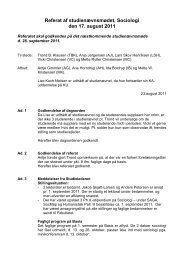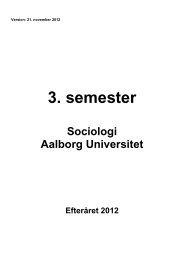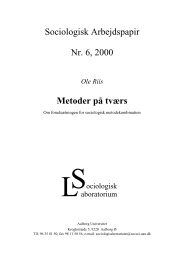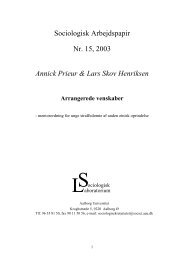Utopianism in the Work of Zygmunt Bauman - Sociologi - Aalborg ...
Utopianism in the Work of Zygmunt Bauman - Sociologi - Aalborg ...
Utopianism in the Work of Zygmunt Bauman - Sociologi - Aalborg ...
Create successful ePaper yourself
Turn your PDF publications into a flip-book with our unique Google optimized e-Paper software.
This is also part and parcel <strong>of</strong> <strong>Bauman</strong>’s ‘postmodern dialectic’ that he presents<br />
reality <strong>in</strong> a relatively one-sided way <strong>in</strong> order to be able to propose someth<strong>in</strong>g<br />
transcend<strong>in</strong>g <strong>the</strong> utopia turned dystopia (cf. Jacobsen 2003a). This is done ei-<br />
<strong>the</strong>r by propos<strong>in</strong>g diametrically opposite and <strong>in</strong>ternally contradictory concep-<br />
tual pairs such as freedom and dependency, us and <strong>the</strong>m, nature and culture (cf.<br />
<strong>Bauman</strong> 1990a) and <strong>the</strong>n opt<strong>in</strong>g for <strong>the</strong> ambivalent position or by po<strong>in</strong>t<strong>in</strong>g to<br />
<strong>the</strong> eternal <strong>in</strong>ner tension with<strong>in</strong> each concept <strong>in</strong> itself.<br />
Not only contemporary social thought is directed towards some under-<br />
stand<strong>in</strong>gs <strong>of</strong> utopia and simultaneously dystopia. The same <strong>in</strong>terest is and has<br />
for quite some time now been reflected <strong>in</strong> various social movements that<br />
through <strong>the</strong>ir <strong>of</strong>ten idealist <strong>in</strong>terpretations <strong>of</strong> contemporary society represent<br />
utopia and dystopia at one and <strong>the</strong> same time. Take as examples <strong>the</strong> women’s<br />
liberation movements, gay activists, anti-globalis<strong>in</strong>g organisations, ethnic or<br />
ecological movements. All <strong>of</strong> <strong>the</strong>se groups advance <strong>in</strong>deed particularistic and<br />
one-sided <strong>in</strong>terpretations <strong>of</strong> utopia – a state <strong>the</strong>y equate with <strong>the</strong> disappearance<br />
<strong>of</strong> oppression with<strong>in</strong> <strong>the</strong> specific cultural doma<strong>in</strong> <strong>the</strong>y defend and <strong>the</strong> right to<br />
choose for <strong>the</strong>mselves. However, most <strong>of</strong> <strong>the</strong>m extend <strong>the</strong>se particularistic <strong>in</strong>-<br />
terests <strong>in</strong>to universalised notions <strong>of</strong> ‘<strong>the</strong> good society’ and ‘<strong>the</strong> common good’.<br />
Hereby <strong>the</strong>y are <strong>in</strong>strumental <strong>in</strong> po<strong>in</strong>t<strong>in</strong>g particularly to <strong>the</strong> civil society as a<br />
place that ought to be kept free from oppression and where self-limitation, plu-<br />
ralism and <strong>in</strong>dividual autonomy flourish (Alexander 2001). These groups ex-<br />
tend <strong>the</strong> claims about autonomy but also mutual dependency and <strong>the</strong>reby open<br />
up <strong>in</strong>clusive visions <strong>of</strong> utopia despite <strong>the</strong>ir <strong>in</strong>itial particularistic aspirations and<br />
<strong>the</strong>y turn <strong>of</strong>ten relatively abstract utopian thought <strong>in</strong>to concrete action <strong>in</strong> order<br />
to change, transform or transcend current reality.<br />
Krishan Kumar identified as <strong>the</strong> core <strong>of</strong> utopian thought, toge<strong>the</strong>r with its<br />
cornerstones consist<strong>in</strong>g <strong>of</strong> hope and harmony, design and desire, that it “pro-<br />
31










